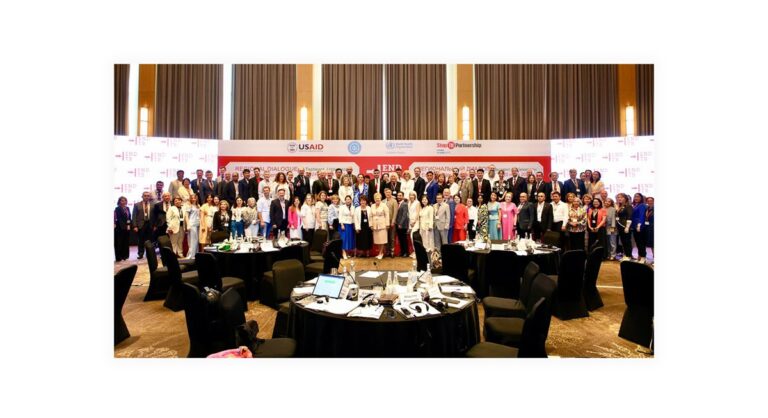June 24, 2024, Tashkent, Uzbekistan
For the first time since the UN high-level meeting in September last year, the Stop TB Partnership and the WHO Regional Office for Europe brought together 100 key stakeholders and partners from 13 countries in Eastern Europe and Central Asia to discuss and debate the current status of the airborne tuberculosis (TB) pandemic, the high incidence of drug-resistant TB (DR-TB) and the challenges towards eliminating the disease.
The two-day high-level regional conference, held in Uzbekistan’s capital, Tashkent, was part of the Stop TB Partnership effort, funded by the United States Agency for International Development (USAID), and aims to increase political commitment, domestic resources and innovative financing methods, and create a regional movement to end TB through strategic engagement and dialogue.
Uzbekistan’s selection as host country reflects the extraordinary political commitment of the Uzbekistan government, led by the Ministry of Health, to eradicate TB.
Over the past decade, Uzbekistan has strengthened its prevention, diagnosis and treatment of TB and drug-resistant TB, steadily improving success rates. The country’s forward-thinking and bold leadership has focused increased funding for TB programs, invested heavily in drug procurement and remains firmly committed to the goal of eliminating TB by 2030.
The Eastern Europe and Central Asia (EECA) region reported around 250,000 cases of tuberculosis (TB), the world’s largest cause of infectious disease deaths after COVID-19, in 2022. Despite progress in the fight against the disease, TB, especially drug-resistant TB, remains a major public health concern in the region and a cause of premature deaths.
The call for increased funding comes nearly a year after the UN High-Level Meeting on TB was held as part of a global effort to work together towards the goal of ending the TB epidemic by 2030.
According to data reported to WHO, most Western European countries are making good progress towards eliminating TB, while some countries in Eastern Europe and Central Asia continue to have high numbers of drug-resistant TB cases. The EECA region accounts for 24% of the world’s multidrug-resistant or rifampicin-resistant TB (MDR/RR-TB) cases and 47% of pre-drug-resistant TB cases.
Although tuberculosis is a preventable, treatable and curable disease, it still claims 1.6 million lives worldwide each year.
“We are confident that the region can provide leadership in eliminating TB. The 13 countries represented here, together with various stakeholders, have had to make TB a thing of the past for their people. We are grateful for the partnership with all national stakeholders, the WHO Regional Office for Europe and other partners, because we are confident that together we can find solutions to eliminate TB, not in isolation, but by integrating our efforts towards strengthened national health systems,” said Dr Rucica Ditiu, Executive Director of the Stop TB Partnership.
“We are still a long way from eliminating TB in the European Region, but there is hope,” said Dr Hans-Henri P. Kluge, WHO Regional Director for Europe. “New evidence shows that shortening MDR-TB treatment regimens to nine months results in an 83% success rate, compared to the three years it previously took to treat MDR-TB. And with no injections and far fewer pills to take, patients can receive treatment in their communities, and in some cases continue to work. These new breakthroughs are only possible with concerted investments in new diagnostics and treatments, which is why I am hosting the first-ever Global Health Investment Forum for Central Asia in Bishkek later this week. This two-day event will help accelerate investments in health, because as we all know, without health there is no economic growth and no prosperity.”
The objective of the conference was to bring together key regional stakeholders to develop strategies to further strengthen national and regional responses and advance the shared goal of ending the TB epidemic by 2030.
The conference was attended by representatives from 13 high-burden countries in the TB burden region, including Armenia, Azerbaijan, Georgia, Kazakhstan, Kyrgyzstan, Mongolia, Poland, Republic of Moldova, Romania, Tajikistan, Turkmenistan, Ukraine and Uzbekistan, as well as participants from international organizations such as the United States Agency for International Development, the Global Fund to Fight AIDS, Tuberculosis and Malaria, the World Bank and the Asian Development Bank, as well as leaders and experts from WHO and the Stop TB Partnership.
About the WHO Regional Office for Europe
The WHO Regional Office for Europe is one of six WHO Regional Offices worldwide. It comprises 53 countries in Europe and Central Asia, covering a vast geographical area stretching from the Atlantic to the Pacific. The Regional Office’s work towards achieving health for all is underpinned by the European Work Plan 2020-2025. The WHO Europe Regional TB Action Plan 2023-2030 outlines the vision and strategic actions to support Member States in implementing their national responses to the TB epidemic and provides a strategy to enable the Region to achieve the goals of the global TB elimination strategy.
About the Stop TB Partnership
Stop TB Partnership is a unique UN-sponsored organization based in Geneva, Switzerland, committed to revolutionizing the TB sector to eliminate TB by 2030. The organization works with over 2,000 partners around the world to foster inter-sectoral collaboration. Stop TB Partnership’s various teams and initiatives take bold and smart risks to identify, fund and support innovative approaches, ideas and solutions to ensure that the TB community has a voice at the highest political levels and that all people affected by TB have access to affordable, quality, people-centred care.
—————————–
This page was corrected on 25 June 2024 because it incorrectly stated the TB target as 2050 when it should have been 2030.


